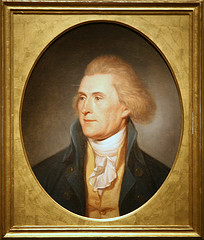Posted by Roberta Grimes • July 05, 2017 • 14 Comments
Human Nature, Slavery, The American Revolution
 There is a theory that if you pick up a calf at its birth and then every day thereafter, eventually you can pick up a bull. It’s a nice idea, but I can personally testify that it is not true. I cannot believe that I haven’t found time to write a new blog post in the past two months! But I realize now that while the calf was growing and I have been struggling with it daily, more and more of my former life was slipping away.
There is a theory that if you pick up a calf at its birth and then every day thereafter, eventually you can pick up a bull. It’s a nice idea, but I can personally testify that it is not true. I cannot believe that I haven’t found time to write a new blog post in the past two months! But I realize now that while the calf was growing and I have been struggling with it daily, more and more of my former life was slipping away.
Becoming modestly known is such an odd phenomenon that I wish more people could experience it. As with picking up that growing bull, the weight of it creeps up gradually, so it’s hard for me to pinpoint now precisely when my personal life disappeared, when my legal career shrank to almost nothing, and when my next FUN book was put aside. Apparently my blogging stopped in May, and by now even my podcasting is taking a beating as I have less time to prepare for interviews. What has largely taken over my life is a combination of correspondences with readers and listeners – sometimes responding takes most of my day – and lots of work on a project related to The Fun of Living Together that has captured my heart. But I’m coming up for air a bit now. Perhaps I’ll never be able to pick up that bull, but I seem at last to be learning to ride it!
And yesterday was the Fourth of July, which once again has me thinking about the young man who took up his quill in the heat of a Philadelphia June long ago and wrote  what became our nation’s creed.
what became our nation’s creed.
Thomas Jefferson hated slavery. It was a highly personal issue for him, since before he was thirty-one he inherited almost three hundred human beings. He couldn’t legally free them in the Colony of Virginia, but he didn’t want lifelong responsibility for them. He thought at first that he might persuade the Virginia House of Burgesses to allow slaveholders to free their slaves, but he learned when he arrived at the Continental Congress in June of 1775 that freeing slaves who looked so different from their masters was going to be a difficult trick.
Slavery may be the oldest human institution. It has existed over millennia, everywhere on earth, but nearly always the slaves have resembled their masters. It has therefore generally been easy to free them and let them blend into the larger society. But black slaves were already being freed in the north, and what Jefferson found in Philadelphia was a desperate underclass of newly-freed slaves, hungry and despised and clinging to the edge of the larger white society without hope of ever entering it. He was horrified! He realized then that the worst British sin had been the introduction to this continent of an aberrant form of slavery where masters and slaves looked so different from one another that we might never be able to end it. He was so upset about this discovery that the first draft of our Declaration of Independence was full of what John Adams wryly referred to as “Jefferson’s philippic against the slave trade.”
It is difficult for us to imagine now what was in the mind of a 33-year-old about to  risk his life and his family’s lives by provoking a war with the world’s greatest power over the principle of personal freedom. Reading his letters at the time, you never see him waver; but you do see how much the slavery problem troubled him. He thought that for his countrymen to be claiming their own freedom while giving no thought to the slaves among them was almost to render absurd their claim, so part of that original philippic – and almost all of what remains of it now – lies right there near the top of the document. Delegates to the Congress may not have understood the full import of what they were signing, but in fact it was a heartfelt cry that no matter what the cost and no matter what effort might be required, the only possible outcome of this struggle must be a continent where slaves, too, were free.
risk his life and his family’s lives by provoking a war with the world’s greatest power over the principle of personal freedom. Reading his letters at the time, you never see him waver; but you do see how much the slavery problem troubled him. He thought that for his countrymen to be claiming their own freedom while giving no thought to the slaves among them was almost to render absurd their claim, so part of that original philippic – and almost all of what remains of it now – lies right there near the top of the document. Delegates to the Congress may not have understood the full import of what they were signing, but in fact it was a heartfelt cry that no matter what the cost and no matter what effort might be required, the only possible outcome of this struggle must be a continent where slaves, too, were free.
Let’s look at the import of Jefferson’s words:
We hold these truths to be self-evident,
(He wrote at first that these truths are “sacred and undeniable,” but this was one Congressional edit that improved the document.)
that all men are created equal,
(“All men” included slaves, and of course it also included women. But how radical this thought was at a time when most people believed that the upper classes were born to dominate those with lower status!)
that they are endowed by their creator with certain unalienable rights,
(The concept of rights given by God was not new, but “the divine right of kings” to rule was usually the most important of these rights. That individual rights might come first was a revolutionary concept.)
that among these are life, liberty, and the pursuit of happiness.
(The universal usage at that time was “life, liberty, and property.” But Jefferson clearly meant to deny slaveholders the right to claim people as their property, and instead he decreed that slaves, too, have an equal right to freedom and a chance at happiness.)
“We hold these truths to be self-evident, that all men are created equal, that they are endowed by their creator with certain unalienable rights, that among these are life, liberty, and the pursuit of happiness.”
they are endowed by their creator with certain unalienable rights, that among these are life, liberty, and the pursuit of happiness.”
These were the breathtakingly radical words of a young man who never in the end was able to perfect the world that he inherited, but at least he could envision that more perfect world. His dream in turn became Dr. Martin Luther King Jr.’s dream. It still beckons to us today.
photo credit: iki-photos <a href=”http://www.flickr.com/photos/22229390@N06/2669305164″>même pas peur</a> via <a href=”http://photopin.com”>photopin</a> <a href=”https://creativecommons.org/licenses/by-nc-sa/2.0/”>(license)</a>
Excellent and appropriate blog.
Thank you, Bill!
I believe the regions in Northern Europe were united into Germany in 1871; My paternal grandparents came from there. As did my maternal great-grandparents. The legacy that came from my 4 grandparents was that of parent rejecting child. My parents rejected me because I am not a male. They never forgave me for this. I am working on gratitude and forgiveness as Roberta has suggested to me. I’m only getting started.
I’m sorry about your history, Glenda, but I really do think that gratitude and forgiveness will relieve you of a lot of this pain!
Your ‘pursuit of happiness’ may not include the lifting of a bull, but that is a great metaphor for what you are doing right now, in this day and age (on this timeline) to create a reality for humanity where the idea of personal freedom is what holds the key to positive change on Earth.
Hello Mary! Many thanks for your kind words. I have to admit that, much as my life has begun to feel overwhelming, I wouldn’t have it any other way!
Lovely to see you back on here, Roberta with your weekly (?) blog. Of course there’s nothing I could possibly disagree with in Jefferson’s words above, and it seems strange to us now that such attitudes existed. Those attitudes also existed between white colonialists in ‘British” East Africa but, having lived for a year on the outskirts of Nairobi, I attended Kenya’s independence celebrations on 12 December 1963, and felt and experienced the euphoria when Kenyans became their own masters. What a fantastic day that was!
Hello Brian! We have indeed come a long way, haven’t we?
According to Wikipedia, Thomas Jefferson had six children with Sally Hemmings. Although the children were 7/8 European, they were raised as slaves at Monticello. They received preferential treatment but Jefferson did not otherwise acknowledge his fatherhood. He did not pursue two who left without permission and granted freedom to his other children via his will. But the other slaves of Monticello who were not related to Sally Hemmings were not given their freedom, even after his death. In my opinion, Jefferson was representative of his period – idealistic but flawed when it came to his actions.
Wikipedia crowd-sources opinions and not facts so it is often in error, and this case is no exception. The father of the children of Sally Hemings was Thomas Jefferson’s younger brother, Randolph: the evidence for this scenario is overwhelming, but of course it’s more fun for judgmental modern folks to pin it all on Thomas. And there are complex reasons why Jefferson did not free his slaves, foremost among which are three: for much of his life he could not legally free them; freed slaves lived such appalling lives that he considered them to be better off under his care; and in his old age his unwillingness to sell either land or slaves rendered him penniless because he willingly ran Monticello as an unpaid hotel in keeping with the customs of the time so people often arranged to break their journeys at the former president’s house.
He was human, sir, but he was not so flawed as you imagine him to have been. The more I study the man, the more astonished I am at just how vastly honorable he was!
How do you address the extraordinary complexities of racism in America that have resulted because of slavery? Racism is in the air we breathe! We’re all tainted by it regardless. It would be enormously helpful if people, especially white people, would start educating themselves about the horror of slavery and it’s ongoing impact. In recent years, there have been some very good books on helping us untangle this madness, i.e., America’s Original Sin (that also includes the damage done to Native Americans), by Jim Wallis, Tears We Cannot Stop, by Michael Dyson, Who’s Afraid of Post Blackness – What It Means to Be Black Now, by Toure and Dear White American, by Tim Wise. As Wise says, “…we are responsible for how we bear that legacy, and what we make of it in the present. There is a difference, and it is not a small one, between guilt and responsibility…” As DYson says, “I simply want to bear witness to the truth I see and the reality I know. And without white America wrestling with these truths and confronting these realities, we may not survive. When it comes to race the past it always present.” We desperately need to understand this. You should contact Professor Dyson. He’s on the faculty of Georgetown University and/or look up the work of Professor Peggy McIntosh of Wellesley. Her initial work on racism and white privilege was ground breaking. I applaud you effort, Roberta.
The history is indeed horrendous. America never actually completed emancipation, so even today more than half of the descendants of slavery live much reduced lives. My most recent book, The Fun of Living Together, discusses how we can nevertheless end our racial issues in one generation and make of America at last what both our Founding Fathers and Dr. Martin Luther King, Jr. wanted it to be: a free and equal colorblind nation where everyone has a fair chance to rise. Finally solving this problem for the sake of all the children will be my primary cause for the rest of my life.
Roberta,
Some very good points in rebuttal to Robert Kahl’s thoughtful comment.
Could you provide the following sources that describe Randolph as father? I thought it was Thomas as well. I would like to correct this is need be.
Mr. Jefferson may have believed his slaves better off under his care and they may have been. But, that would have been for them to decide not him on their behalf.
First, Dan, Thomas Jefferson was able to see that freed slaves in his time lived absolutely horrendous lives, and he felt his slaves’ welfare to be in his hands: it is irresponsible for us to decide two hundred years later that we know better how he ought to have handled the terrible situation in which he found himself.
And as to the Sally Hemings matter, I researched it extensively about 20 years ago and found the evidence that it was Randolph and not Thomas who had had a relationship with Sally Hemings to be so incontrovertible that I am astonished that the old story has not long since been widely seen as discredited. For example:
1) A relationship could not have begun in Paris. Thomas went to Paris as a widower with his oldest daughter in 1784, and he sent for his middle daughter after the youngest died at Monticello. Fourteen-year-old Sally Hemings accompanied that second daughter to Paris in 1787, but she was a last-minute choice that seems to have been made at Monticello. I have seen it suggested that Paris was where he began a relationship with Sally, but there was no contemporary whisper of it. And Sally didn’t return from Paris pregnant, nor did she become pregnant soon thereafter. Her first child wasn’t born until she was twenty-two years old.
2) Randolph was reportedly often at Monticello when Thomas was there. Randolph’s plantation was twenty miles from Monticello, and contemporary accounts suggest that he was a frequent visitor.
3) Randolph socialized with the Monticello slaves, which was something that Thomas did not do. It was said that Randolph was often in the quarters, and he would “play the fiddle and dance half the night.” My extensive reading of his early correspondence indicates that the young Jefferson hated the institution of slavery and considered the fact that he had inherited slaves and there was no legal or practical way to free them to be a bane and a burden.
4) Sally’s children were conceived during the interval when Randolph was single. Randolph was widowed young, and in defiance of custom he did not soon remarry. By my calculation, all of Sally’s children were fathered while Randolph Jefferson was single. I further have seen evidence that his relationship with Sally was known among the slaves, who on at least one occasion saw him sneaking from Sally’s cabin early in the morning.
5) Thomas and Sally later were together in the same house for two decades without more children. Sally’s last child was conceived in 1807, when she was only 33 and shortly before Randolph ventured west. Jefferson lived for nearly twenty years more, and during all that time Sally Hemings served as a Monticello house servant. If her children were Thomas’s and not Randolph’s, why on earth did she stop bearing so young?
6) There are no reports that Jefferson took a special interest in Sally Hemings. I have seen no contemporary reports that anyone saw affection between them. Although he freed her children, he did not free Sally at his death. Given the decades during which they lived in close proximity in a house full of servants, and given the fact that Sally bore six children (four survived), this lack of contemporary evidence of an apparent relationship between them seems to me all by itself to be a full refutation of the rumor.
7) The story that Sally Hemings bore Jefferson’s children is rooted in vitriol. The only contemporary evidence that Jefferson might have been the father of Sally Hemings’s children was the word of a reprobate named James T. Callendar whom Jefferson had denied an appointment as the Postmaster of Richmond, Virginia, and who bore the then-President a public grudge.
8) There is no other evidence of a Thomas-Sally relationship. Those seeking to advance the notion that Jefferson was the father of Sally Hemings’s children have nothing but Callendar’s attacks to rely on, so they have advanced what they call additional evidence. All of it is speculative in the extreme. For example, Thomas Jefferson took measures to screen his private rooms from outside view when he returned to Monticello following his presidency. It has been suggested that he was seeking to hide a relationship with Sally, but this action of his has a simple explanation rooted in colonial custom: it had long been usual for travelers on the road to stop for the night at plantations on the way, and so many people took advantage of that fact and arranged to be near Monticello at nightfall so they could be the former president’s guests that in Jefferson’s old age his home became an unpaid hotel. With so many strangers wandering his grounds, it is not surprising that a man so private wanted to keep people from looking in at him.
9) Thomas’s personality and character make such a relationship unlikely. Eighteenth-century gentlemen thought very differently from people living today. It is easy for us to say that, what the heck, Sally looked like Thomas’s late wife and she was his property, so naturally he would have had his way with her. But gentlemen in his day were obsessed with guarding their honor, and Thomas Jefferson was fastidious about this to a fault. His extensive writings make it seem unlikely that he was capable of thinking as we do. And even though in many ways he was a different man after Martha’s death, I think the fact that Sally was his property – in the absence of any other good evidence – is thin justification for deciding that therefore he must have been the father of her children.
10) It has just been reported that Sally’s quarters have been found to have been adjacent to Thomas’s chamber. It is entirely unsurprising that an old man would have wanted a familiar house servant to be nearby at night, so this “additional evidence” doesn’t bear at all on whether he fathered children with her decades before.